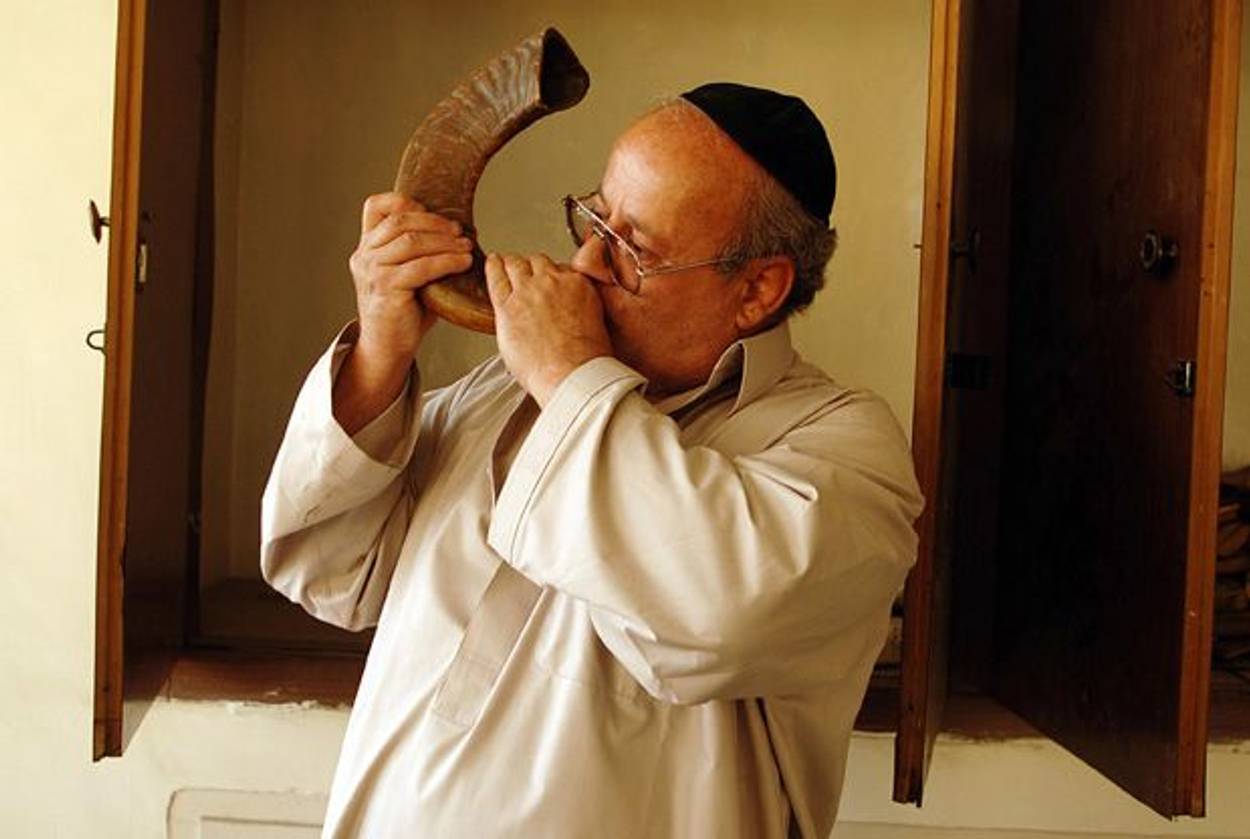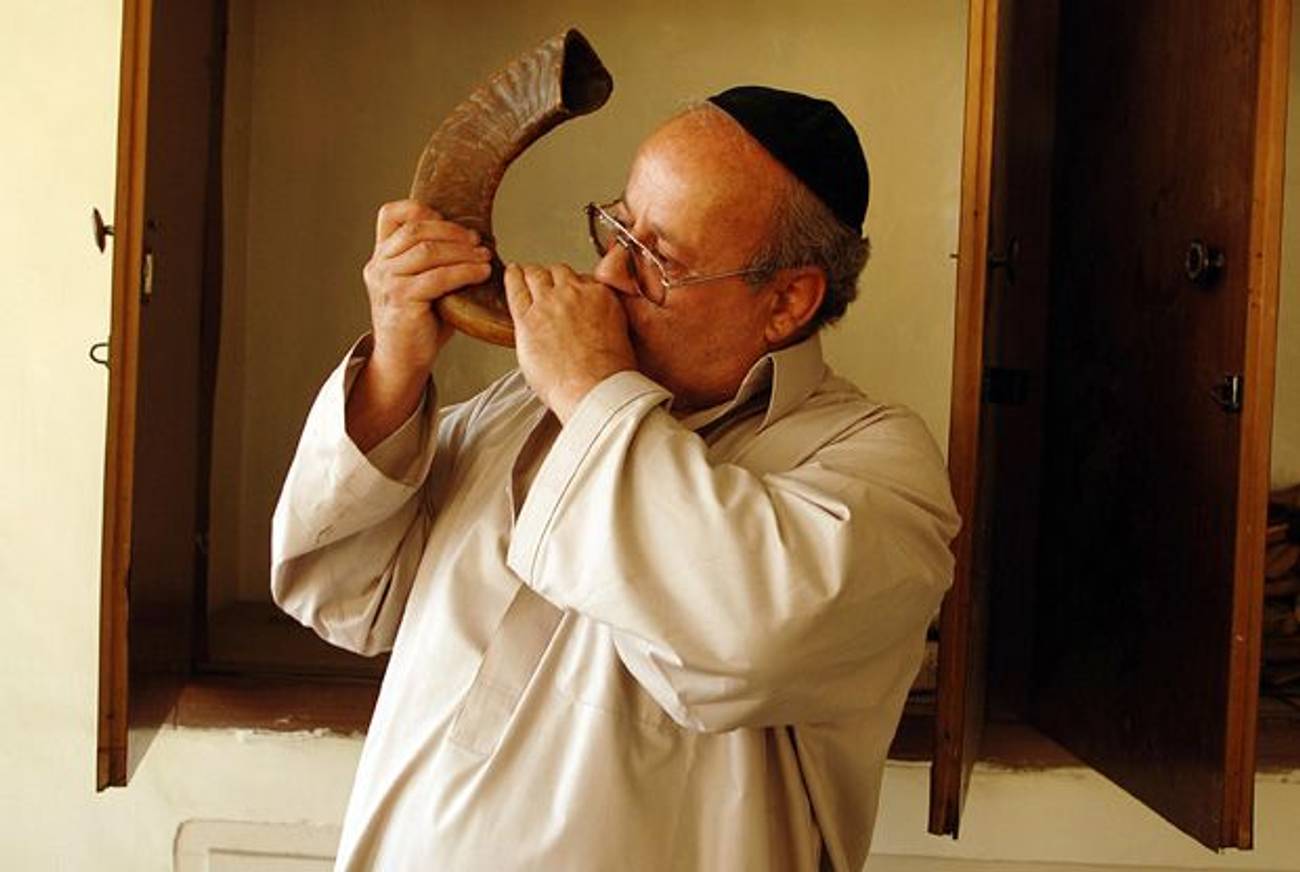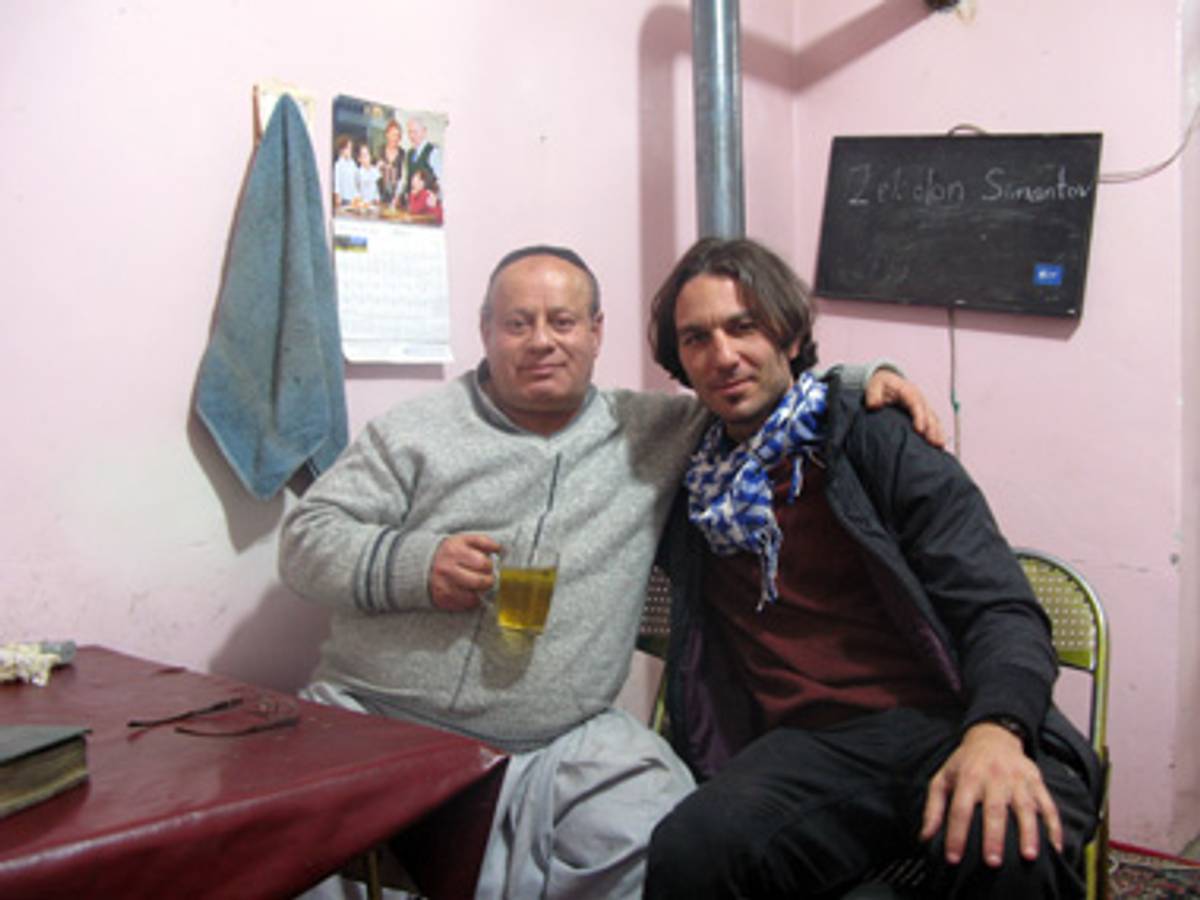A Congregation of One
When I met the last Jew in Afghanistan, I rediscovered the Jewish identity I’d rejected years before




On a 2010 trip doing research in Kabul, I met the last Jew in Afghanistan.
I found him on Flower Street at the synagogue known by locals as “the Jewish Mosque.” It’s the last shul standing in Kabul, and nobody goes to it anymore—no one but him. The corrugated-iron door was laden with Stars of David. The dome was barely hanging together. A heavyset man wearing a kippah came to the door and asked what the hell we wanted. Qais—an Afghan friend, carpet-seller, and writer with a peculiar obsession with Holocaust literature, who’d brought me there—told him I was a Jew. The last Jew in Afghanistan looked at me with scorn. “So what?” he seemed to be saying. “What’s another Jew?” Then he turned his back and said, “Come on.” I followed him into the synagogue compound.
Much has been written about Zablon Simintov—about his personal history, his vanished community, his enduring faith. But as he led us into the synagogue where he lived, kvetching and moaning as we entered the courtyard, I wasn’t thinking about his story; I was thinking that he looked a lot like my Uncle Marvin. And by the time I left, I wasn’t focused on the decline of Afghanistan’s Jewish community; I was thinking more about rediscovering my own Jewish identity, which I thought I’d left behind.
I had come to Kabul with my friend and colleague Christopher Morris to interview Taliban and their families for a play we were writing. This was eight years after the Daniel Pearl murder in Karachi, and every journalist I’d talked to before coming to Pakistan and Afghanistan advised me not to disclose my Jewish identity. “If anyone asks,” one warned clearly, “you’re Christian.”
We certainly heard plenty of anti-Semitic and anti-Zionist rants: how the Mossad were responsible for 9/11 and how Israel was the reason the drones were flying over Waziristan. It didn’t make me want to wear a chai as I walked through the red light district in Lahore. We did our best to blend in; we grew long beards, put on shleppy shalwars, and wore our kameez long. Looking back, I now realize we probably looked like we were CIA.
Denying my Jewish background while traveling in Afghanistan and Pakistan was easy enough. I had already stopped believing in the prayers, in the rituals, in the community. Back home in Toronto or Berlin, I usually identified myself an atheist (although I was also told not to admit that either in Pakistan and Afghanistan, where atheists are as suspicious as Zionists and the CIA). I wasn’t sure I could even call myself Jewish at that point. I’d written about my Jewish background extensively; it marks my poetry, my plays, and a memoir appropriately titled Ambivalence. But ever since I’d published the memoir in 2008, I’d stopped thinking about Judaism. And what is Jewishness without identifying with it in some way? Even if it’s a questioning, a struggle, a debate?
Then Christopher, who is Catholic, told Qais that I was Jewish, ending my charade and making philosophical questions about the true essence of Jewishness moot. And Qais took me to his country’s only other Jew. As Simintov led me up a narrow set of stairs, I wondered how this sense of identity had evaporated. There was part of me that wanted it back.
Judaism wasn’t just important to me—it formed me. One of my earliest memories is lying in my childhood bed. I was 4 years old and God was in the corner, watching. My childhood God was Orwellian: I imagined a tiny video camera hanging from the ceiling, recording everything. When I fell asleep, I thought, God would play, replay, and assess my days’ actions.
Growing up in a Conservative Jewish home in Toronto, there were a lot of laws to follow—613, and then some. I learned the rules and did my best to follow them at Bialik, a Labor Zionist school. While my Israeli teachers’ methods were fraught with screaming, broken chalk, and the occasional threat of violence, their demand for order made sense to me. I flourished in those years. I took delight in memorizing the dates of Jewish history, the shifting maps of Israel, Israeli poetry and literature. And I enjoyed obeying the Talmud and its commands, the black and white of Jewish morality, even when cloaked as debate.
I was a good Jew and a great believer: in Israel, in God, in the relentless history of a people knocked down, again and again, always getting back up. My family attended a modern Orthodox shul on Saturdays, kept a kosher house, and did weekly Friday night dinners. While my brothers struggled with Bialik and the boredom of synagogue, I thrived. I sang in the synagogue choir. I worked nightly to commit the amazing stories of Zionism to memory. In my twenties, I traveled to Eastern Europe for the first time to visit my baba’s shtetl. Upon returning, my impulse was to become more religious, so I attended an Orthodox synagogue in downtown Toronto’s old Kensington Market. Preserving my grandparents’ legacy felt important. Essential. It was the reason I was alive.
And yet certain doubts started to creep in. As a boy I felt I was singing to God—that’s what the minor keys were, the holy language. Now, as an adult, the words of the prayers bothered me. There was too much violence, too much anger and jealousy from this supposedly kind God I was meant to be thanking. And just what was I thanking him for? Peace on earth? My zayde’s dementia? The Holocaust? The more I prayed, the farther I felt from God. If God existed, he lived in a remote suburb, not here in the downtown core. And if he didn’t exist, why was I praying?
In those days at the Minsker shul in Kensington, talk about Israel was frequent; it was the second intifada and people were concerned. Not just about the death of the peace process and Oslo, but for the people we knew living in Jerusalem, Haifa, and Tel Aviv. We were worried about the bombs going off on random buses, about the fear and terror in a country we were all connected to. I avoided the politics—it all seemed endlessly complicated. But the more I went to shul, the more I found myself thinking about Israel. What was this Israel we were directing our prayers to?
So, in 2003, when I was 30, I went to find out, by myself. I had had opportunities over the years—to go on Birthright, to work on kibbutzim, to study in yeshiva—but that didn’t interest me. I avoided all programs, tour books, and anything that resembled an agenda. I spent time with Orthodox friends in Jerusalem, Palestinian friends in the West Bank, and artists in Tel Aviv. I asked questions, and I listened. I understood the connection to the land; the history is everywhere and self-evident. But the discrimination I heard—the vitriol and hatred lodged against the ones who weren’t supposed to live there but inconveniently did—went against everything I’d thought Judaism stood for.
One night in Jerusalem I was in a shul in Nachlaot. I had spent the afternoon in Qalandya refugee camp, speaking with Palestinian children. While we were dancing with the Torah at the end of the service, singing, “Am Yisrael Chai,” I noticed the man next to me wearing a holster. Inside was a pistol. Nothing unusual in that; this was Israel, after all. But it occurred to me that if Jews were a chosen people, there would always be others who were not-chosen. God, nation, exclusivity, violence: It all seemed inextricably linked. I decided I didn’t want to be part of that anymore.
This was what inspired me to write my memoir. Prior to Ambivalence, my writing tended to be concerned with finding a modern interpretation of Judaism—reinventing old mythologies, in my poetry in particular. But the memoir felt like a purging, a coming out: I voiced my reservations and criticisms, though it was never my intention for it to be a vehicle that led to my exit off the stage of Judaism.
Deciding to “leave” Judaism wasn’t something I felt good about. My parents were surprised, I think, by the passion behind my criticism. Friends of theirs likely wondered about the poor job they’d done at raising this “self-hating Jew”; an unfair accusation, since my opinions are my own—and inaccurate, since the ideas in the book were neither hateful nor angry, but inquisitive and honest. Still, I felt incredibly guilty when I handed the rabbi at the Minsker shul a copy of the book. Friendships were lost because of what I said about Israel. New friendships were formed, but I felt like something was irretrievable and gone, now that I’d spoken the truth—my truth, at least. The night I walked out of that synagogue in Nachlaot, I’d walked out on my faith, never to return, or so I thought.

Simintov’s one-room apartment had a small burner where he could cook, a kettle for making tea. The walls were painted pink, and there was a calendar with a picture of a very American-looking family circa 1950 lighting a menorah. I remembered it was Shabbos, and I wondered if Simintov prayed alone.
I realized I was envious. Here in Kabul, where an ancient community that once numbered several thousand had been reduced to a single person, was a man whose faith was so strong, so resilient, that he lived next to a synagogue. Prayer didn’t bother him. Prayer was his life. I couldn’t even say what or who I was.
When I gave him tea as a gift, he slammed it on the table and said, “You call this tea? I’ll show you tea.” (Simintov was my Uncle Marvin.)
He put on the water to boil. He spoke Dari, but the intonation was familiar—very much like the Winnipeg Yiddish-inflected English my uncle spoke when I was a child. Simintov was confused as to why I was there; he thought I was a journalist. I assured him I wasn’t but it was hard to say what I wanted. Teach me to believe, I wanted to say. But believe in what? God had left me—or I’d left God. Somehow my experience in Israel had shut off the video camera; he was no longer watching me, which also meant I was left with nothing. It bugged me that I even cared about the religious stuff anymore. Was I just hanging on to the past?
Simintov didn’t have such qualms or questions. He knew what he wanted: cash for his story. I told him I’d make a donation to the shul before I left. He seemed annoyed.
“So, what do you want to know?” he asked.
“Where is your family?” I asked. “Where did everyone go?”
“There used to be several hundred families living here on Flower Street. They went to Israel during the civil war. My wife and daughter,” he explained. “They live in Israel, too.”
“And you never wanted to join them?”
“What do I want in Israel? This is my home. This is where I belong.”
On a small TV next to his bed, Afghan pop videos bounced up and down on the tiny screen.
“For over 1,500 years Jews lived in Afghanistan. I am from Herat—there were many Jewish families there, and yeshivas, too. I come from a line of rabbis. I studied to be a shoichet. I make my own kosher meat.”
“Do the neighbors bother you?” I asked, thinking about the warnings I’d received, the hatred I imagined stewing in the crumbling streets and markets of Kabul.
Simintov shook his head.
“The Taliban?” I asked. “Don’t they hate that you’re Jewish?”
Simintov laughed. “When they were in power, they wanted to pay me $20,000 to convert to Islam. So, I offered them $80,000 to become Jews.”
He bemoaned the loss of his carpet business—the Taliban had apparently stolen his collection of rugs. But he did not complain once about his situation as the country’s lone surviving Jew.
Up until fairly recently there were two Jews in Afghanistan, Simintov and Ishaq Levin. They got along well—for a time. The animosity began when Levin suspected that Simintov was trying to ship him off to Israel so that he could have the synagogue to himself. Simintov argued that he was simply worried about Levin’s health. Levin died in 2005, leaving Simintov alone. What struck me about Simintov’s situation was not so much the climate of hatred and fear, but his utter loneliness. He was practically forgotten. Invisible. And it was a role he’d chosen. Looking around the room, it didn’t make sense. What was his Judaism, this congregation of one? He clung to it, life, whatever there was of it left. But what did he have? Kabul was a ruined city, bombed to shreds after four decades of war. Why wouldn’t he want to be in Israel with his family, his people?
“I won’t let Jewish history die in Afghanistan,” said Simintov.
He took me to the synagogue. It felt more like a museum than a place for sanctuary and prayer. The last Torah had been stolen by the Taliban. Books were charred and moldy. The walls were white, recently painted, and a thin blue gate encircled the bimah. Simintov took out a shofar from the ark, put it to his mouth, and posed.
He prayed alone, ate alone, lived alone. It was a life he chose. Simintov wasn’t exactly a biblical prophet in the style of Ecclesiastes or Jeremiah, alone in the desert waiting for revelation. But his stubborn independence was his Judaism. Maybe this is what it means to be Jewish, I thought. To go against the grain.
Trying to understand the nature of one’s own existence is a task that befuddles the best of us. It’s why people turn to religion and the ancients in the first place. We want and need answers to the mysterious whatever that has brought us here. But what if religion was a question, and not an answer? What if God wasn’t a judge, but a window onto mystery? What if faith wasn’t about comfort, but discomfort, a cry into the intolerable void?
It’s been three years since I met Simintov. I still don’t pray, but I did go back to Pakistan this past September. On a number of occasions I was asked what my religious background was, and each time I answered: I’m a Jew. I was in Lahore during the Mohammed video riots, and it wasn’t a good place or time to be a North American, let alone a Jew. The signs on the street said: “Death to America.” Saying I was Canadian didn’t help either; the rumor on the streets was that CIA agents were using false passports from Western countries other than America. Danger was everywhere. But somehow I was calm. Sometimes I even answered my Muslim questioner’s curiosity by telling them what exactly a Jew is. Simintov’s lesson stayed with me—stronger than any rabbi’s or Hebrew teacher’s.
It’s still hard for me to reconcile an atheistic humanism with Judaism. But I’ve learned to accept there is something about the uncertainty of my Jewishness that I cannot live without. Even the emptiness I feel, the disconnect and the discomfort, are something I need: for my art and my life. Simintov’s philosophy—to follow your path, however strange—is something I can believe in. On certain days I even might believe in something like God. To go against the grain is to allow for these contradictions. Celebrate them, even. I wouldn’t deny my identity again, in Afghanistan or Pakistan, Canada, or America, even if it meant putting my life in danger.
Jonathan Garfinkel is an award-winning writer currently based in Montreal. His book Ambivalence was published in 2008 by Norton and Norton.